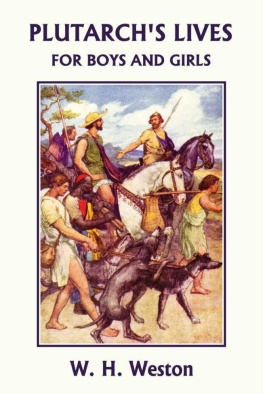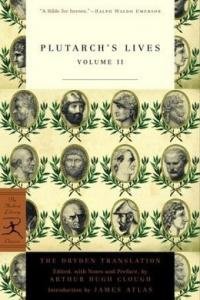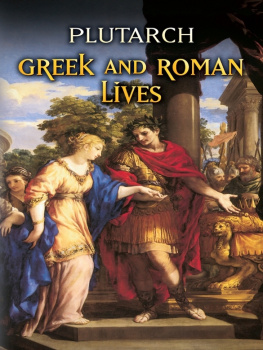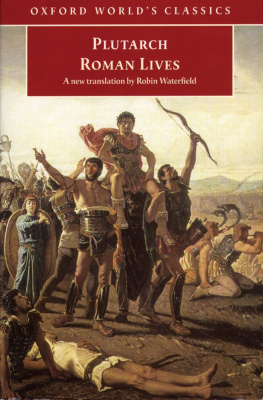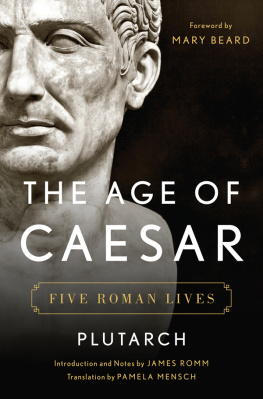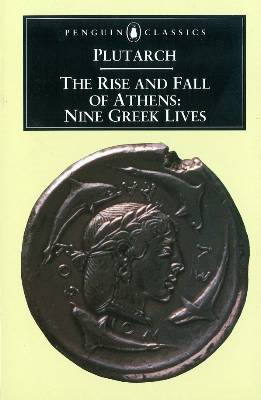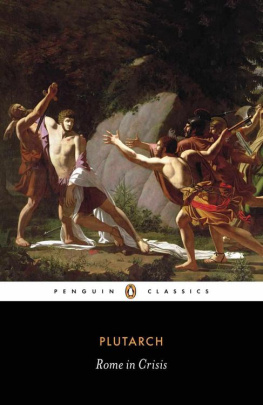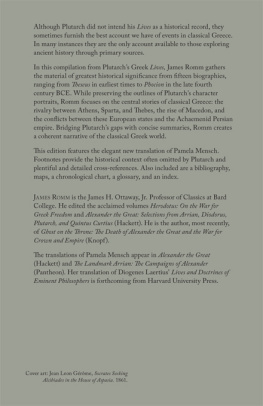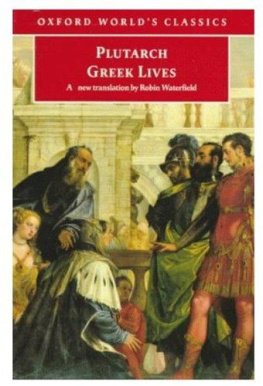W. H. Weston - Plutarchs Lives for Boys and Girls
Here you can read online W. H. Weston - Plutarchs Lives for Boys and Girls full text of the book (entire story) in english for free. Download pdf and epub, get meaning, cover and reviews about this ebook. year: 2008, publisher: Yesterdays Classics, genre: History. Description of the work, (preface) as well as reviews are available. Best literature library LitArk.com created for fans of good reading and offers a wide selection of genres:
Romance novel
Science fiction
Adventure
Detective
Science
History
Home and family
Prose
Art
Politics
Computer
Non-fiction
Religion
Business
Children
Humor
Choose a favorite category and find really read worthwhile books. Enjoy immersion in the world of imagination, feel the emotions of the characters or learn something new for yourself, make an fascinating discovery.
- Book:Plutarchs Lives for Boys and Girls
- Author:
- Publisher:Yesterdays Classics
- Genre:
- Year:2008
- Rating:5 / 5
- Favourites:Add to favourites
- Your mark:
- 100
- 1
- 2
- 3
- 4
- 5
Plutarchs Lives for Boys and Girls: summary, description and annotation
We offer to read an annotation, description, summary or preface (depends on what the author of the book "Plutarchs Lives for Boys and Girls" wrote himself). If you haven't found the necessary information about the book — write in the comments, we will try to find it.
Plutarchs Lives for Boys and Girls — read online for free the complete book (whole text) full work
Below is the text of the book, divided by pages. System saving the place of the last page read, allows you to conveniently read the book "Plutarchs Lives for Boys and Girls" online for free, without having to search again every time where you left off. Put a bookmark, and you can go to the page where you finished reading at any time.
Font size:
Interval:
Bookmark:
All rights reserved. No part of this book may be reproduced or retransmitted in any form or by any means without the written permission of the publisher.
This edition, first published in 2010 by Yesterday's Classics, an imprint of Yesterday's Classics, LLC, is an unabridged republication of the work originally published by Thomas Nelson and Sons in 1900. This title is available in a print edition (ISBN 978-1-59915-293-6).
Yesterday's Classics republishes classic books for children from the golden age of children's literature, the era from 1880 to 1920. Many of our titles are offered in high-quality paperback editions, with text cast in modern easy-to-read type for today's readers. The illustrations from the original volumes are included except in those few cases where the quality of the original images is too low to make their reproduction feasible. Unless specified otherwise, color illustrations in the original volumes are rendered in black and white in our print editions.
This book aims at presenting, for the reading of boys and girls, a version of certain selected narratives from the immortal Lives of Plutarch.
In making the selection, the writer has been guided by the wish to choose those lives which appear to him to be most likely to interest young readers, and which also exhibit most clearly, either by example or contrast, the beauty of patriotism and the nobility of the manly virtues of justice, courage, fortitude, and temperance.
The selected lives have been freely retold. The discursive reflections, in which Plutarch frequently indulges, have been generally omitted; so also have many proper names not necessary to the full understanding of the stories. But, While much has been omitted, the writer has not presumed to add matter, other than seemed necessary to explain the importance or bearing of events, or to make the narrative clear to young readers. He trusts, therefore, that the version here presented retains much of the manner and method of Plutarch, and especially that the distinctive quality of that author which, to many readers throughout the ages, has given form and substance and a living reality to the heroes of ancient story, otherwise but the shadows of great names, has not been sacrificed.
He trusts, too, that his young readers may realise from Plutarch how little the essential things of life have changed during twenty centuries and more of the world's history; that, though trireme has given place to ironclad, and javelin-flight to bullet-hail, Salamis and Marathon called for the same wisdom, foresight, and courage as Trafalgar and Waterloo; and that to-day our country may demand from us, according to the measure of our abilities, service as unselfish and self-sacrificing as that which the noblest heroes of ancient Greece and Rome rendered to the lands whose history their deeds illumine for all time.
W. H. W.
A RISTIDES lived during the earlier part of the fifth century before Christ, a time when the liberties of the Greek states and cities in Europe were threatened by the vast hosts of the Persian Empire. The Persians had already conquered and enslaved the Greek cities of Ionia, that is, the coast districts and adjacent islands of western Asia Minor. Moreover, the Greeks in Europe were by no means united in opposition to the Persians. Hence it appeared almost certain that the vast forces at the disposal of the Persian king would speedily overrun the Greek states, and that their liberties and their civilisation would be destroyed, or at any rate profoundly altered, by the rule of a despotic foreign king. Had such been the event of the war, the whole subsequent history of Europe through all the ages would have been changed, since our civilisation has its roots in the glorious achievements of Ancient Greece. For this reason the great victories in which the Greeks overthrew the vast Persian armies have a direct personal meaning for every one of us to this day.
In the three great battles by which Greece was saved, Marathon, Salamis and Plata, Aristides played a distinguished part. The first of these, the battle fought in the plain between the mountains and the sea, where
'The mountains look on Marathon
And Marathon looks on the sea,'
showed that the Persians, who had never before been beaten by any army of Greeks, were not invincible. It proved indeed that their vast hosts could be conquered by a small number of Greeks who were inspired by staunch patriotism and dauntless courage.
The chief credit for the second of the great victories belongs to Themistocles, the great rival of Aristides. Not least among the glories of Aristides, however, is the lofty patriotism with which he put aside all feelings of personal enmity, and devoted himself to second the plans of his rival by which the sea-fight at Salamis was won, the Persian navy destroyed, and King Xerxes himself driven from Europe.
In the battle of Plataea the army which Xerxes had left behind was utterly destroyed and the dread of Persian conquest removed. In this battle the Spartan, Pausanias, was in chief command, but Aristides shared in the glory of the day, though, in truth, the victory was won by the valour of the Greek soldiers rather than by the skill of their generals.
A RISTIDES was an Athenian by birth, but accounts vary as to his station in life. For While some say that he was always very poor, another writer contradicts this view, and endeavours to prove that his family possessed a fair estate.
Some writers say that Aristides was from infancy brought up with Themistocles, who was destined to be his chief rival in the leadership of affairs at Athens. They tell us also that even in childhood the two were always at variance, not only in affairs of some importance but even in their sports and games, and that in their opposition they showed the differences in character which distinguished them throughout their careers. Themistocles was plausible, bold and artful, changeable in mood and yet impetuous in action. Aristides, on the other hand, was plain and straightforward, absolutely just and incapable of any falseness or deceit even in play.
When both had grown up, Themistocles proved himself a pleasant and agreeable companion. He made many friends, and his strength in public affairs depended largely upon his popularity. He did not hesitate to favour his friends, and when some one remarked of him that he would govern the Athenians very well if he would do so without respect of persons, he exclaimed, 'May I never sit upon the seat of judgment where my friends shall not receive more favour from me than strangers.'
Aristides, on the other hand, pursued an entirely different course in public affairs. He could not be persuaded to any act of injustice in order to oblige his friends, though he was willing to help them when what they requested was right and proper. He saw indeed that many, relying upon their interest with people in power, did things which could not be justified, but he, for his part, held that a good citizen should trust for his safety solely to the justice and rectitude of his actions.
But, as Themistocles made many rash and dangerous proposals and always endeavoured to thwart him in every way, Aristides was, in his turn, obliged to oppose his rival similarly, partly in self-defence and partly to lessen the power of Themistocles, which was daily growing through his popularity. Indeed, with the latter purpose, he was sometimes induced to oppose proposals of Themistocles which were good in themselves. Thus, on one occasion, he strenuously and successfully opposed a motion of Themistocles which he nevertheless felt to be of advantage to the public. Conscious of the evil of this rivalry between them, he could not forbear saying as he went out of the assembly, 'Athenian affairs cannot prosper unless both Themistocles and myself are put to death.' Very often Aristides put forward his proposals by means of a third person, in order that the public welfare should not suffer through the opposition of Themistocles to him. His steadfastness amid the frequent changes of political affairs was wonderful. Honours did not elate him nor was he cast down by ill success; in either case he pursued his course, convinced that his country had a claim to the services which he rendered without thought of advantage to himself. Not only was he able to resist the promptings of favour and affection, but also the temptation to let enmity and revenge sway the scales of justice.
Font size:
Interval:
Bookmark:
Similar books «Plutarchs Lives for Boys and Girls»
Look at similar books to Plutarchs Lives for Boys and Girls. We have selected literature similar in name and meaning in the hope of providing readers with more options to find new, interesting, not yet read works.
Discussion, reviews of the book Plutarchs Lives for Boys and Girls and just readers' own opinions. Leave your comments, write what you think about the work, its meaning or the main characters. Specify what exactly you liked and what you didn't like, and why you think so.

